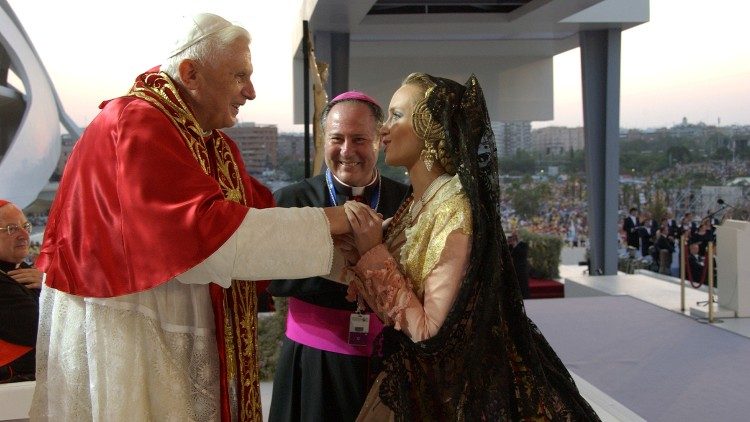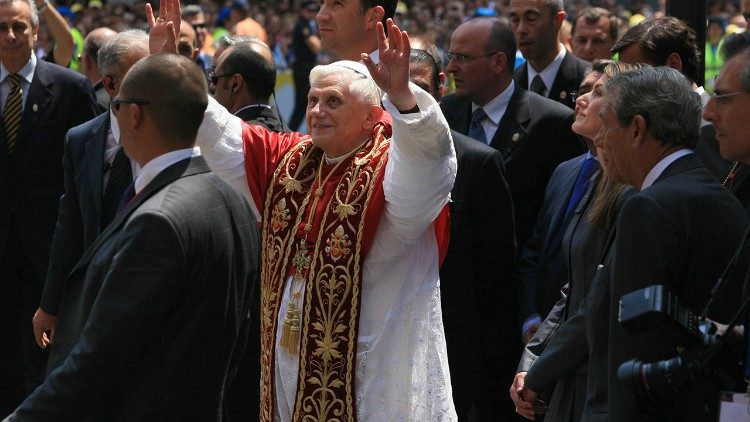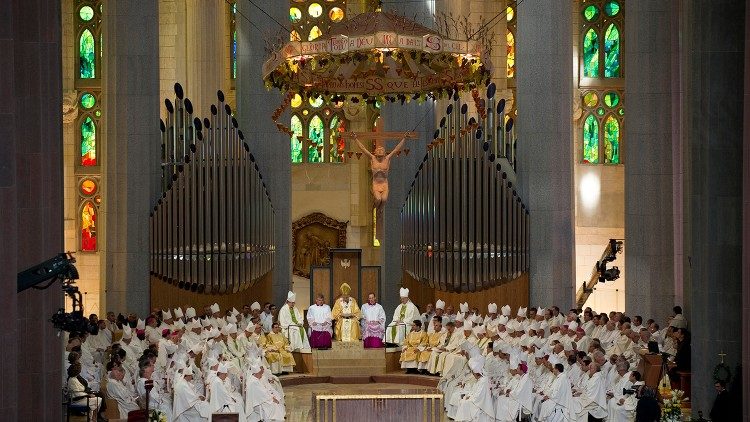“Adeeply admired the great Spanish mystics. Above all to Saint Teresa and Saint John of the Cross, whose works constitute his spiritual nourishment. Perhaps because his life as a Catholic intellectual was always guided by spirituality and truth”
“Spain was a country known and loved by the Pope. And a country that worried him especially. Not surprisingly, His Holiness’ trip to Compostela and Barcelona will be the second he has made to Spain since he assumed the keys from Peter”
“In 2006 he visited Valencia on the occasion of the V World Meeting of Families. And he also traveled to Madrid to preside over World Youth Day”
“In 2006 he visited Valencia on the occasion of the V World Meeting of Families. And he also traveled to Madrid to preside over World Youth Day”
Benedict XVI felt a “special predilection” for Spain. Says his spokesperson, the Jesuit Federico Lombardi, little given to hyperbole. And, when the Vatican speaks of “special predilection”, it means that Pope Ratzinger loved Spain. For what it was (the hammer of heretics and evangelizer of the New World), for what it is (laboratory of secularism) and for what it may be in the immediate future (test bench for the re-evangelization of the countries of old Christianity).
Olegario González de Cardedal He is one of the few Spanish theologians who can boast of being a friend of Pope Ratzinger. A friendship made in the classroom and at the heights of theological research. A friendship between the emeritus professor of Salamanca and the first professional theologian Pope. Olegario was the first to bring him to Spain and to guide him through Ávila and Salamanca in the Ibiza of Adolfo González Montes, then also a professor at the Pontificia and today Bishop of Almería.

This is how the already emeritus professor of the Pontificia tells it: “Ratzinger came to Spain for the first time in 1989 and then in 1993, to speak at the Theology courses at the Complutense University that I directed. But he has had bad luck between the capture of some groups, who wanted to appropriate it by affirming that Ratzinger was the orthodoxy represented by them, and the caricature of others, who coined and repeated undaunted: the iron cardinal, the inquisitor closed in his tower of ivory, the hammer of liberation theology, the cause of the closure of the Church before modernity”.
From El Escorial, Ratzinger took the opportunity to visit the Valley of the Fallen, in the company of Gustavo Villapalos, then rector of the Complutense. Villapalos himself recounted that, back in Madrid, Ratzinger confessed to him that the Valle de los Caídos monastery had interested him more than that of El Escorial and most of those he knew in Europe “because of the originality of its conception and its spirituality”. .
Ratzinger was also in Barcelona and Compostela, already as Pope, but not before. It is not for nothing that his papal coat of arms presents, in its most noble part, a golden shell, a symbol of the pilgrim and also a traditional symbol of faith.
In 1998, he was invested Doctor Honoris Causa by the University of Navarraand took advantage of his visit to Pamplona to present his autobiographical book ‘My life’ at a press conference in which he stated that “there is no dialogue with crimes” and urged “awareness” against terrorism “from the perspective of humanism”.
The then Cardinal Prefect of the Doctrine of the Faith returned to Spain on several occasions. Two of them to Murcia. In 2002, to officiate a mass in Caravaca de la Cruz with which the third phase of the Preparatory Year for the Jubilee Year was inaugurated and to close a Christology Congress organized by the “San Antonio” Catholic University of Murcia. And even then he told the media that “a united Europe should not be just something economic or political, but rather it needs spiritual foundations, since the Christian faith continues to be the criterion of the fundamental values of this continent, which in turn has given to light other continents”. Two years later he returned, again, to the Catholic University of Murcia. Within a few months, he reached the pontifical throne.

Spanish mystics, food for your soul
But more than the landscapes and the Hispanic geography, what the emeritus Pope of our country knew best are our mystics. Benedict XVI was an accomplished specialist on Saint Augustine and Saint Bonaventure (the saint to whom he dedicated his doctoral thesis), but deeply admired the great Spanish mystics. Above all to Saint Teresa and Saint John of the Cross, whose works constitute his spiritual nourishment. Perhaps because his life as a Catholic intellectual was always guided by spirituality and truth.
In fact, his episcopal motto is “Truth Cooperators” (3Jn 8). A motto that, as Olegario González explains, connects “with the motto of Western philosophical thought: ‘vitam impendere vero’ (risking one’s life for the truth), from Juvenal who formulated it to Descartes and Rousseau, who inscribed it as an exergue of their plays. The phrase speaks of a risky search and a risky delivery of truth and life. Wasn’t that the heart of the Spanish novel at the beginning of the 20th century from Unamuno to Baroja?
Concerned about the Spanish drift
Spain was a country known and loved by the Pope. And a country that worried him especially. Not surprisingly, his Holiness trip to Compostela and Barcelona will be the second he has made to Spain since he assumed the keys from Pedro. In 2006 she visited Valencia on the occasion of the V World Meeting of Families. And she also traveled to Madrid to preside over World Youth Day. Three trips in five years. More visits than her home country of Germany, where she was only twice. As Francisco Vázquez, the Spanish ambassador to the Holy See, says, “we will have the honor of being the country visited the most times by the current Pontiff, which constitutes a deference, and at the same time, special attention.”
And, deep down, a symptom of concern. And it is that Catholic Spain to machamartillo and spiritual reserve of the West has been secularized at a forced march in recent years. The figures speak for themselves and the CIS barometers are implacable. Currently, 72% of Spaniards declare themselves Catholic, compared to 80% 8 years ago, but only 14% go to mass. In addition, half of the young people already turn their backs

But, as always, the data presents two readings. And before the previous black face, the bishops usually present a more positive one. Because the truth is that between 8 and 10 million Spaniards continue to go to mass every Sunday, a number of militant believers well above that brought together by political parties, unions and even football fans together.
secularism laboratory
Hence, what most worried Rome in the time of Benedict were not so much the figures of the dwindling religious practice, but rather the drift of a country that, a few years ago, was, along with Italy, Ireland and Poland, one of the nations basically Christian, to become the country champion of secularism.
The then Pope’s Minister of Culture and cardinal-elect said it, Gianfranco Ravasi: “Before, when one spoke of a secular nation par excellence, one thought of France. For some time now, the first place in this ranking has belonged to Spain”. And, although the Roman curial does not make it explicit, he is logically referring to Zapatero’s Spain.
In the opinion of the ecclesiastics, the president of the socialist government had turned Spain into the symbol of secular Europe and in moral transition. And with a situation that, according to Cardinal Rouco Varela, then president of the Spanish Episcopal Conference, is getting worse. Because “five years have passed since the new regulation of marriage in the Civil Code, which has ceased to recognize and protect marriage in its own specificity, as a partnership of life between a man and a woman. Also this same year, a new law has been approved that represents a serious setback in the adequate protection of the life of those who are going to be born”.
And the cardinal of Barcelona, Luis Martinez Sistach He stressed the idea and assured that “the Holy Father is hurt by the situation in our country”, which is launching a new abortion law, after approving gay weddings.

With the aggravating circumstance that Rome feared the contagion effect of Zapatero’s policies. Especially in Latin Americawhere several countries have already approved homosexual marriages and others are preparing to decriminalize abortion.
With fluid relationships in the shapes, softened over the years by the engineering work of Maria Teresa Fernandez de la Vegaof the former Foreign Minister, Miguel Ángel Moratinos and of the then Spanish ambassador to the Holy See, Francisco Vázquez, the background to the fight remains the same.
And in the background Pope Benedict will address his messages. Always with the purposeful tone and nothing imposing of him, Benedict XVI wants to vindicate, loud and clear, the defense of the family and of life from conception to death. Because, as the Vatican spokesman himself recognized, “those are the issues that distance us from the Government.”
That was the crusade of Pope Ratzinger, together with that of the recovery of Christian roots. Because one of Benedict XVI’s priorities was serene and constructive dialogue with those who lose faith and abandon it. That is to say, with which every day the already numerous rows of indifference increase. because he was deeply convinced of the benefits of faith for daily personal, social and cultural life of the peoples of Europe. Because, as she often used to say, “God gives everything and takes nothing away.” Modern life gains nothing and loses much by its silent apostasy and living “as if God did not exist.”
This Christmas, Digital Religion
